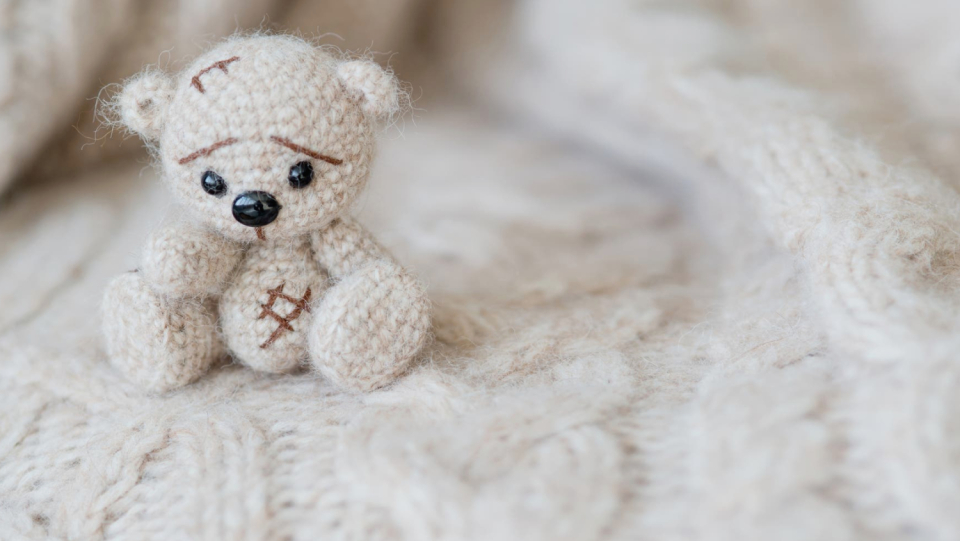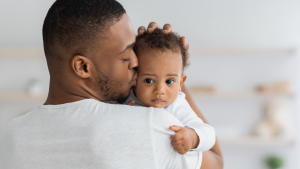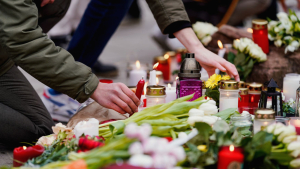Ayla and Chris* had not actually planned to become parents. But the joy was great when they learned that they were going to have a child. In the weeks after Ayla's positive pregnancy test, the couple gradually grew into the role of parents, realigned their lives, made plans and went to the necessary preventive examinations. At first, the values and ultrasound images all looked good – until the control date, which changed everything.
A doctor informed the young parents that their child had several heavier developmental disorders and would therefore not be born alive. "The news hit me like a fist in the face," Chris told me a few weeks later in the hospital room when I met the couple in the Berlin Charité. Ayla and he had followed the recommendation of the doctors and had the pregnancy ended. One day before Christmas Eve, her son Eduardo was born dead in the 16th week of pregnancy. He rested on his mom's chest, lay like an injured little bird in his dad -shaped hands shaped into a trough, wrapped in a self -crocheted blue cloth that an association had donated to the hospital. Eduardo was now a star child - and I had come as a star child photographer to take goodbye pictures of him. Images in which the newly baked and directly orphaned parents could capture themselves who would help them with their grief and with whom they would later present their son to their family when they were so far.
Most people are a fate like that spared Eduardo's parents. In 2020, 773 144 children were born alive in Germany, 3162 were recorded in the official statistics as stillborn. The latter include fetuses that die after the 23rd week of pregnancy, as well as those who already weigh more than 500 grams. If the baby is born earlier or with less weight, one speaks of a miscarriage. These are not listed in the official population statistics, but there are also numbers for them: About every sixth pregnancy ends with miscarriage, and 23 million cases are a year worldwide.
About one in six pregnancies ends prematurely with a miscarriage. In just under one in 250 cases, the baby is born with more than 500 grams of body weight or dead after the 22nd week of pregnancy.
The parents of such "star children" are often hard hit by the loss – even if the child dies early in pregnancy. Relationship problems and mental illnesses can be the result.
In addition to psychotherapy and other professional offers, the environment can also help those affected. It is important to be open to discussions and to give the parents the feeling that they are not alone.
For those affected, such experiences are usually an incisive experience. However, there is hardly any talk about stillbirths and miscarriages in public, as well as in the circle of family and friends. If you specifically ask older relatives, you often find out that there were cousins or even siblings you had never heard of. Previously, it was customary to keep silent about such losses. After the birth, the parents were usually not even shown the deceased child, the small body was "sent for disposal" – a hard fate for those affected. I know women who had a stillbirth 50 or 60 years ago and still can't get over never having seen their child.
That has changed in the meantime. In the medical world, the awareness that dead and miscarriages are not only failed in the medical world, but that it is about a deceased child. In these cases, clinics provide pastors and psychologists to look after the affected parents before and after birth. Sternenkind photographers like me are contacted to take memory pictures of the little ones. The clinics often have pretty towels and baskets ready for this. The parents are given the opportunity to say goodbye to their child in peace; Special relaxation rooms are available in many hospitals. Many clinics work with associations or advice centers that can provide information on self -help groups, therapy options and burials.
The private environment is also important
Although a lot has already improved, the resources are very limited. There are not always enough pastoral staff to take care of all cases with the necessary attention they deserve. The search for therapy places with psychologists who can accompany parents during the grief work is also difficult in Germany. This makes it all the more important that affected families have the opportunity to also seek support in their private and professional environment. But even this is not easy, because the topic is still taboo in public. So it is still customary to wait at least twelve weeks before telling about a pregnancy. Before that, the probability of miscarriage is comparatively high: for pregnant women who are younger than 35, the risk is up to 15 percent. For those aged 35 to 39, it rises to about 25 percent, and from 40 it is about 50 percent. If the expectant parents have not initiated anyone in advance, they often grieve for their baby in silence and alone after a miscarriage in the first trimester. This gives many the impression that they have to quickly conclude with the event and "work" again. Therefore, sufferers sometimes hide their feelings, which puts them under mental pressure in addition to grief. Both increase the risk of developing a mental illness.
In 2021, a research team led by Cèline Lossius Westby from the Center for Crisis Psychology at the Norwegian University of Bergen examined the connection between psychological complaints and a stillbirth. The experts evaluated 13 studies carried out between 1995 and 2019. Overall, the results indicated that parents develop anxiety, depression or post-traumatic stress disorder after a misconception or dead birth. According to the analysis, the symptoms of these diseases were also more pronounced shortly after the traumatic experience. In the course of time, their intensity usually decreased.
There are cases in which those affected suffer from long-term psychological complaints. The consequences of the experience can be felt into the next pregnancy and beyond. This is confirmed by the study published in 2018 by a working group led by Ida Kathrine Gravensteen from the Institute of Clinical Medicine at the University of Oslo. It was attended by 174 women who had become pregnant again after a stillbirth. In the last trimester of subsequent pregnancy, 22.5 percent of them suffered from an anxiety disorder and 19.7 percent from depression. On the other hand, there were 362 women who had previously given birth alive. 4.4 percent of them developed an anxiety disorder and 10.3 percent depression. About one in eight women whose baby had died suffered from both mental disorders, compared to only one in 28 in the control group.
While families who lose a child to a disease such as cancer are often strongly supported by their environment, parents whose baby has already died before birth are more likely to report isolation and loneliness. "Those affected by miscarriages often have the feeling that something is wrong with them, because it is so difficult for them to overcome the death of the child," says psychotherapist Anja Gutmann, who specializes in caring for parents with experience of miscarriage or stillbirth. "The earlier the loss happens in the pregnancy process, the less this need for grief and support is socially acknowledged.«
Pain does not know any week of pregnancy
Several studies have proven that a misconception or dead birth can have psychologically the same effects as the loss of an older child. In 2012, a team led by Pernilla Avelin at the Karolinska Institute in Stockholm carried out a study with 55 parents-33 women and 22 men-whose child was born dead shortly before. The scientists interviewed them immediately after the loss and several times in the course of the following years about their psychological situation, the progress of mourning and the stability of the relationship. It turned out that parents are closely bound to their child in early pregnancy stages and mourn their death.
The week of pregnancy said rather little about how great the feeling of loss would be. More important was the question: how far has a person already identified with the parental role? This can happen after the 4th week of pregnancy or after the 30th, especially couples who have been trying to have a child for a long time quickly take on the parental role, says Anja Gutmann. "From the moment this identification has taken place, it's not about something abstract like a failed pregnancy, but about parents who have lost their child," she adds.
Ayla and Chris had never told anyone about their pregnancy at the time of diagnosis. When they were in the hospital for the birth, they pretended to be on vacation and therefore two weeks to be difficult to reach. She overwhelmed the idea of telling her family about a dead child, whose existence was not yet aware of it. And they asked themselves a question in front of which many affected parents are standing: How do you mourn a child that nobody got to know?
The fact that friends and acquaintances usually do not know how to meet the bereaved contributes to the loneliness of orphaned parents. Many are afraid to say something wrong or aggravate the situation. That's why they tend to keep their distance and wait for those affected to approach them – leaving them alone with their grief. As a rule, parents feel the need to talk about what they have experienced, even if they cannot put their feelings into words at first.
In mourning advice there are many strategies on how to support those affected and their relatives. The most important thing is pretty simple, namely to make you discussion. If you have a couple in the circle of friends that a baby has lost, you can ask: Do you want to tell your child? Do you have photos? Do you want to talk or should I leave you alone? What do you need? Freshly orphaned parents report, they help them when their pain is seen and accepted. It is essential that no unnecessary pressure will be built up so that you don't get the feeling that you have to hurry with your grief.
Saying goodbye helps with grief
Rituals can help to start a conscious processing process. These do not have to be religious or spiritual. For example, parents can paint a wooden box serving as a small coffin in which the child is buried. For most bereaved, the grave of their star child is an important mourning place, regardless of whether it is a single or a common grave. In addition, affected families are happy to set up a small commemorative corner at home. There they arrange photographs together with flowers and small souvenirs to keep the deceased child present in everyday family life. For some, it helps to think about a very personal ritual to say goodbye. Once I accompanied a family who held a small celebration at the calculated date of birth. The orphaned parents went hiking with their friends and relatives, at the top of the summit they have stored stones for the deceased child with good wishes. Other families plant a tree for their baby, some make a small treasure chest with souvenirs such as ultrasound pictures or get a piece of jewelry that reminds them of their child and that they can always carry with them. The possibilities for helpful rituals are very individual, but they all have a function: not to displace grief, but to admit it consciously. This is the only way to process what has happened healthy and sustainably.
Grieving as a couple is particularly challenging for many, as the two partners often have different coping strategies. Especially men often think that they have to be strong for the woman, should not show feelings and have to function again immediately. They are more likely to suppress their own emotions and grief, which on the one hand can make them sick and on the other hand also leads to burdens in the couple relationship. Sometimes conflicts arise because the partner reads the behavior as if the death of the child would not touch the man.
The parents also do not process the loss at the same pace. Anja Gutmann says that after birth, mothers have to cope with everything that has happened to them in the delivery room, while the actual grief process begins with their partner. He is therefore already in the middle of it when she is just beginning to mourn - and that can cause problems. "If the couple is in different places in the processing process, this sometimes leads to complications or misunderstandings in the relationship," explains the psychotherapist.
The strategies for dealing with the experience also differ between the sexes. In general, men would find it easier to cope with grief if they distracted themselves, according to Gutmann. They therefore soon meet up with friends again and throw themselves into work. The everyday gives them a structure and the support they need for their grieving process. Not so with women. »My clients want to move on a very small scale at first.« They need a lot of peace for themselves and the reappraisal process.
These differences are also found in studies. The investigation by Pernilla Avelin and her colleagues revealed, for example, that mothers like to actively talk about what has happened and are looking for an exchange with their partners, while affected fathers tend to quietly process what they have experienced. The majority of the parents surveyed stated that the experience had welded them together, even if the beginning was difficult. Most couples showed understanding of each other's grief style after talking about it. Anja Gutmann also gives a favorable prognosis to almost all couples. It is important to speak out, she reports. "The parents have to talk to each other and explain their own position to each other. If the partner understands you, it doesn't matter what point you are at in each case. Then everyone is allowed to process as he wants.«
The relationship suffers with
When I met with Eduardo's parents in a Berlin café a few months after his birth to personally present them with the pictures of their little boy, we talked about their experiences since birth, among other things. They told me how surprised they had been that this event had put so much pressure on their relationship. It had been important for Chris to be strong for Ayla and not to let it be noticed how much the experiences weighed on him. He tried to conform to the classical role ideas of the male protector and to take himself and his feelings back. He was thinking about his partner, who had to give birth to her child dead, and was of the opinion that he, as a father, should not behave like that.
Ayla, however, only read his behavior as an indifference to the death of her child. There were conflicts. It burdened her that Chris was looking for physical closeness, while that was definitely not an option for her. "For women, it often takes longer than in men until sex is good and lustful again," says Anja Gutmann. "It is obvious that there are misinterpretations when men want sex again - also to make emotional closeness," said the therapist. However, this is nothing that cannot be undergone. It is important to speak honestly about your own feelings and to counter the partner empathy.
In order to strengthen mutual understanding, Gutmann uses a simple exercise in her everyday practice: »One partner says something, the other person may only answer when he has repeated verbatim what the other has said.« Only when the latter says: Yes, you have understood me now, may the other answer to it. »You can discuss any conflict with it,« says the therapist.
Eduardo's parents have also used professional help. They turned to a psychological counseling center to process the trauma together and to better understand the behavior of the partner. The two of them welded the talks led by a therapist: "That saved our relationship," Ayla tells me later.
* The names of the protagonists have been changed to protect their privacy. You are known to the editorial staff.



















